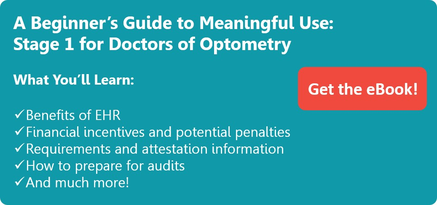Is Your Practice Prepared for Meaningful Use Audits?
Getting audited can be one of the scariest and stressful things that can happen to yo u or your business. In the eyecare industry, it’s really a toss-up – you could go your entire career without being audited, or you could be sent a meaningful use audit notification tomorrow. Either way, you should always be prepared for the worst. Being prepared will unquestionably take the edge off and will actually give you confidence in the face of an auditor. We’ve compiled a few tips and tricks to help you be more prepared for meaningful use audits in 2014.
u or your business. In the eyecare industry, it’s really a toss-up – you could go your entire career without being audited, or you could be sent a meaningful use audit notification tomorrow. Either way, you should always be prepared for the worst. Being prepared will unquestionably take the edge off and will actually give you confidence in the face of an auditor. We’ve compiled a few tips and tricks to help you be more prepared for meaningful use audits in 2014.
Meaningful Use Criteria for Optometrists: What Will You Do in the Event of an Audit?
A Few Things to Remember...
If you've never been audited before there are a few things that you should take into consideration:
- A good number of audits are triggered automatically. They don’t necessarily mean that you’ve got suspicious activity going. CMS will usually audit between 5% and 10% of the attestation documents it receives.
- The people running your audits are by no means experts in the eyecare industry. If something seems off to you, make sure you defend yourself well with sufficient records.
- Since auditors are not fully versed in your field of profession, they oftentimes may come to incorrect conclusions. Don’t be afraid to challenge the outcomes – you may have a good chance at coming out on top!
- If you choose to challenge, be sure to get all the outside help you can. Assistance is always available from state associations. Never rule out seeking legal advice if necessary.
How You and Your Staff Can Prepare
 If you get that dreadful letter in the mail informing you that you will be audited, stay strong and defend yourself! Let’s go through a few tips on how to Prepare:
If you get that dreadful letter in the mail informing you that you will be audited, stay strong and defend yourself! Let’s go through a few tips on how to Prepare:
- Be over obsessive with documenting everything. If you answered yes to a simple question during the attestation process, then go one step further and explain the reasoning behind that. Make sure to keep all your documentation for at least 5 years after your attestation.
- When the auditors request records and files, send it to them as soon as possible. Don’t put it off and tell yourself that you have time to do it tomorrow; it should be of utmost priority.
- Never alter or destroy records that you keep in your office or that you send into the auditors. This is a general rule of thumb when dealing with audits, but it applies heavily in our industry.
- The best way to get on the auditor’s good side is to maintain contact with them throughout the entire process. By doing this, you will be clear of the expectations they have and they will see that you are taking this seriously.
- Don’t forget to call your EHR vendor! They will be able to provide ample support with records and contracts.
- Audits will remain on your records forever… which increases the chances of being audited as your progress through the stages of meaningful use. Unfortunately, it also increases the chances of ODs who work in the practice to be audited. If you are getting audited, do the neighborly thing and notify the rest of the practice immediately.
Moving Forward
Now that you know how to handle the auditing situation, it’s time to shift focus to the future of your profession. Here are some best practices going forward:
- Conduct independent internal audits of each doctor in the office every 6 – 12 months. This way, if you ever do get audited (for the first time or again), you will already know everything that they find. Being overly prepared is always better than being blindsided.
- Encourage your doctors and staff to make following compliance a habit. Keeping a thorough record of information should become a habit – not out of fear of being audited, but out of good practice. Doing this will even help you remember what you did during each patient exam if the patient returns or has more questions.

